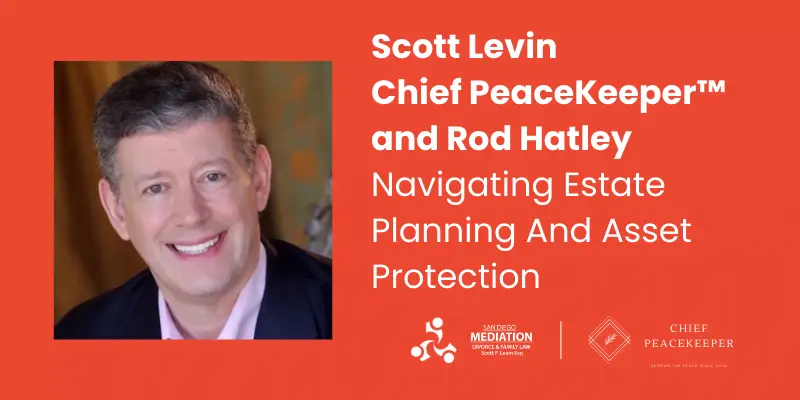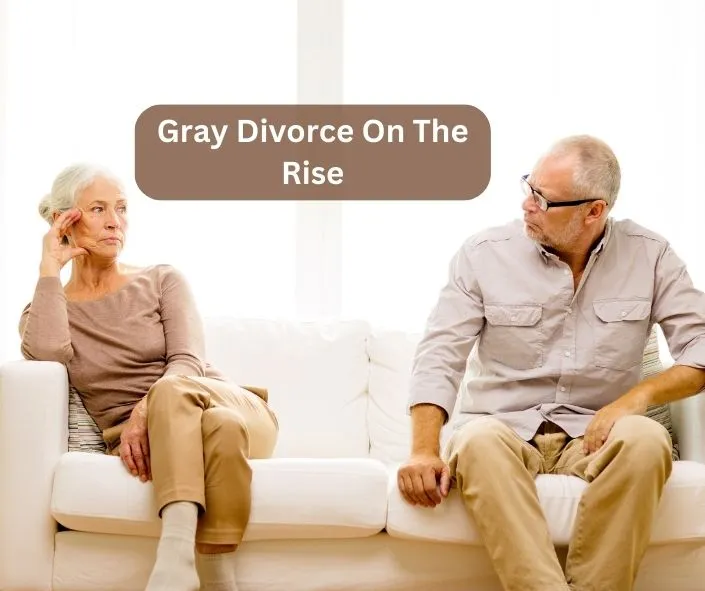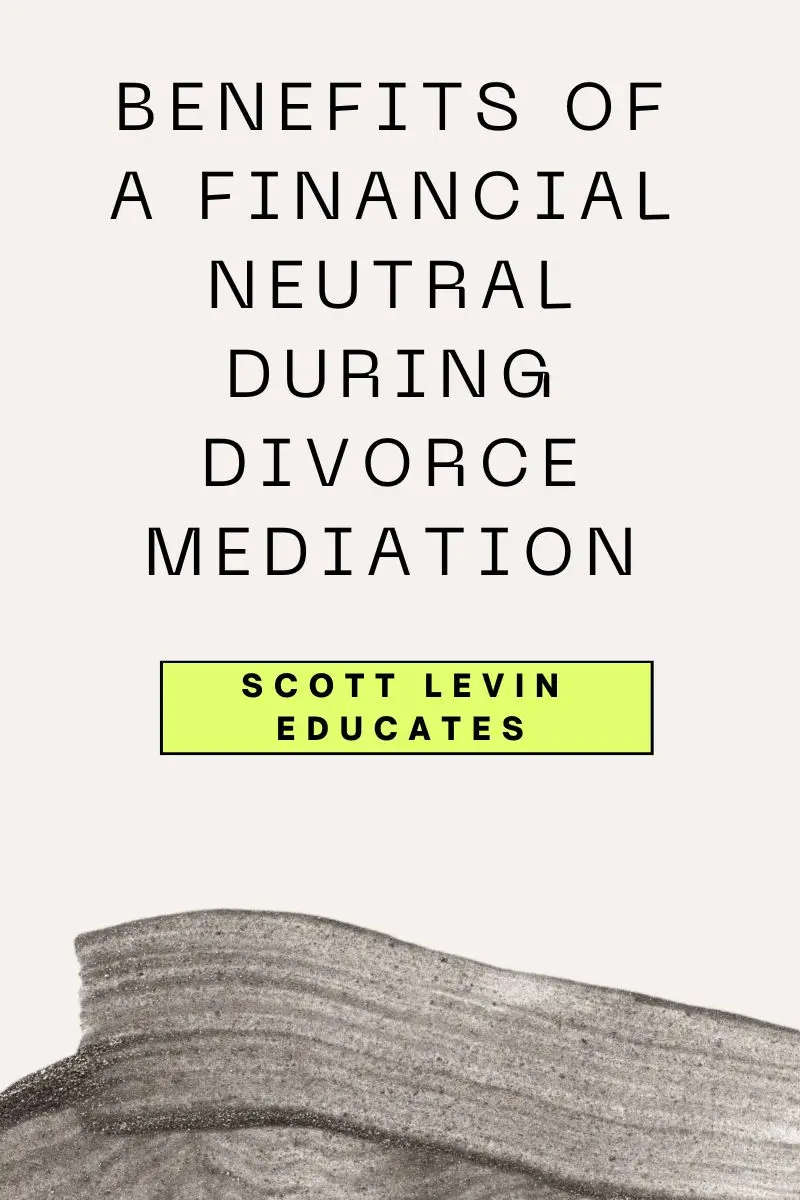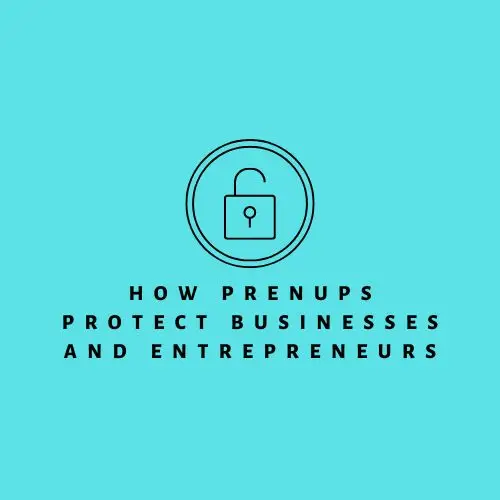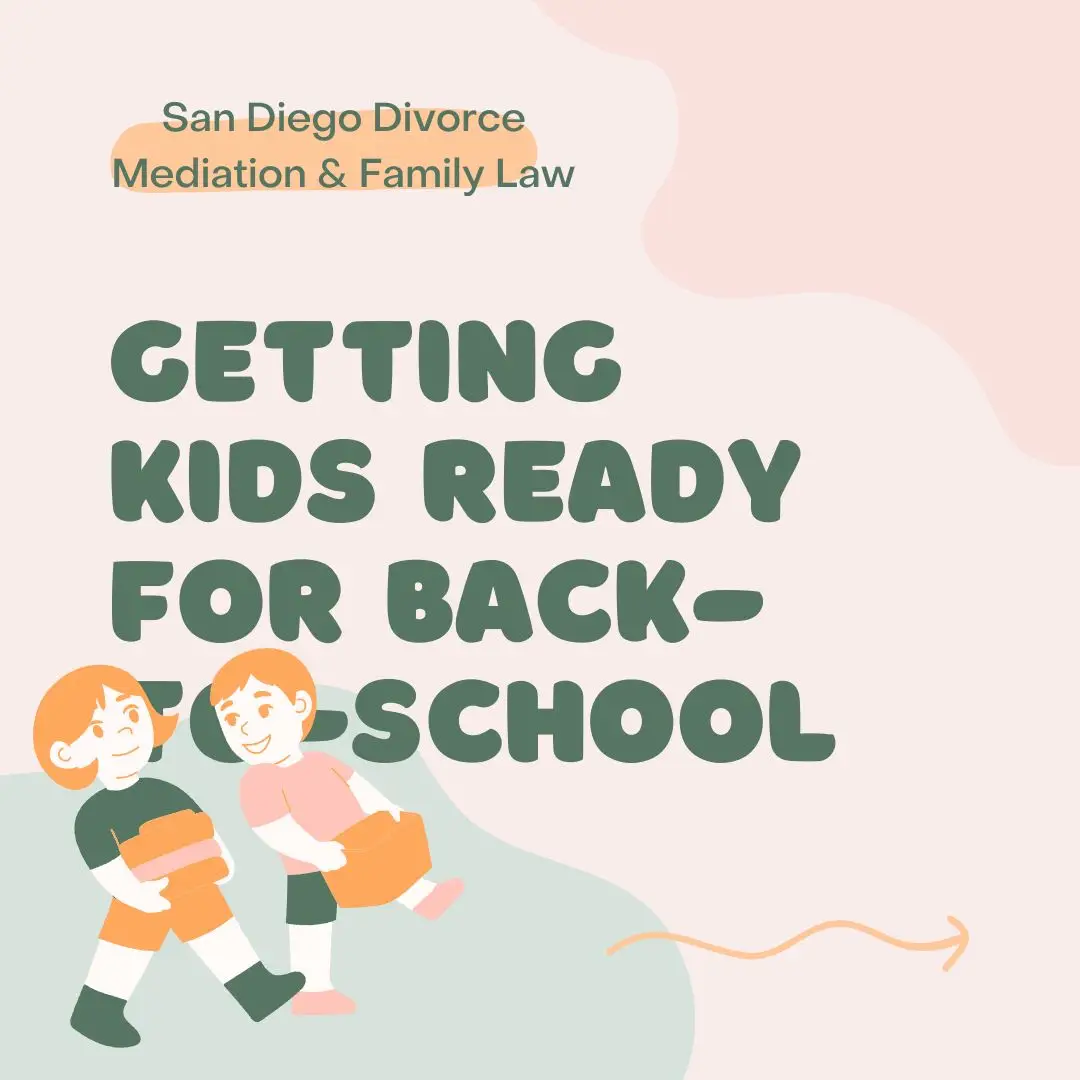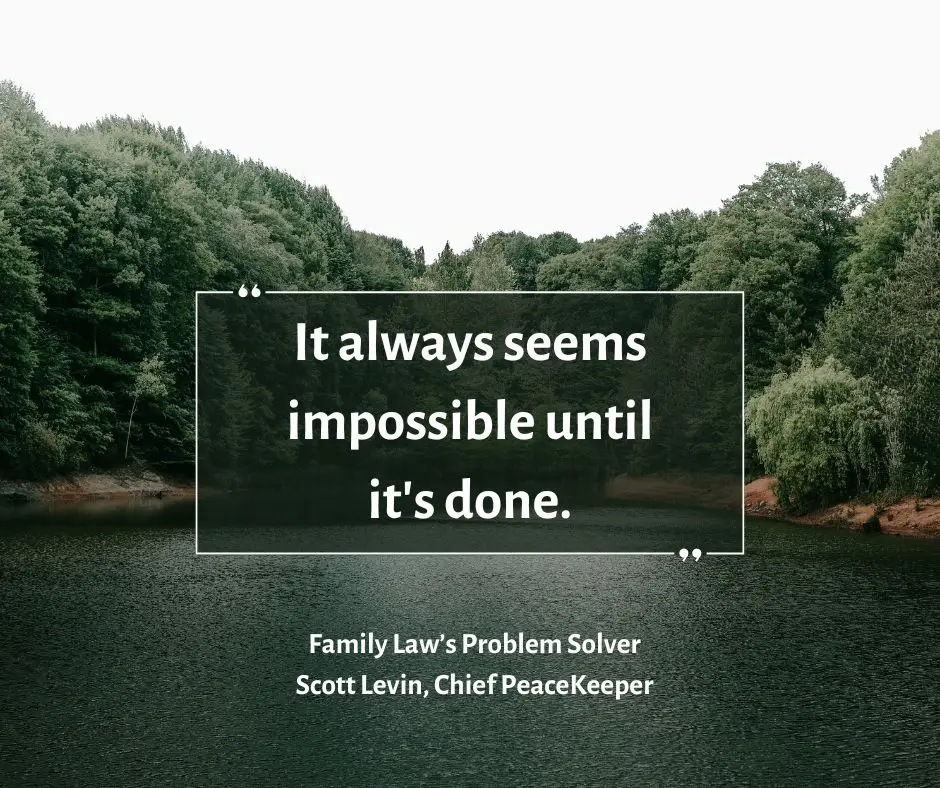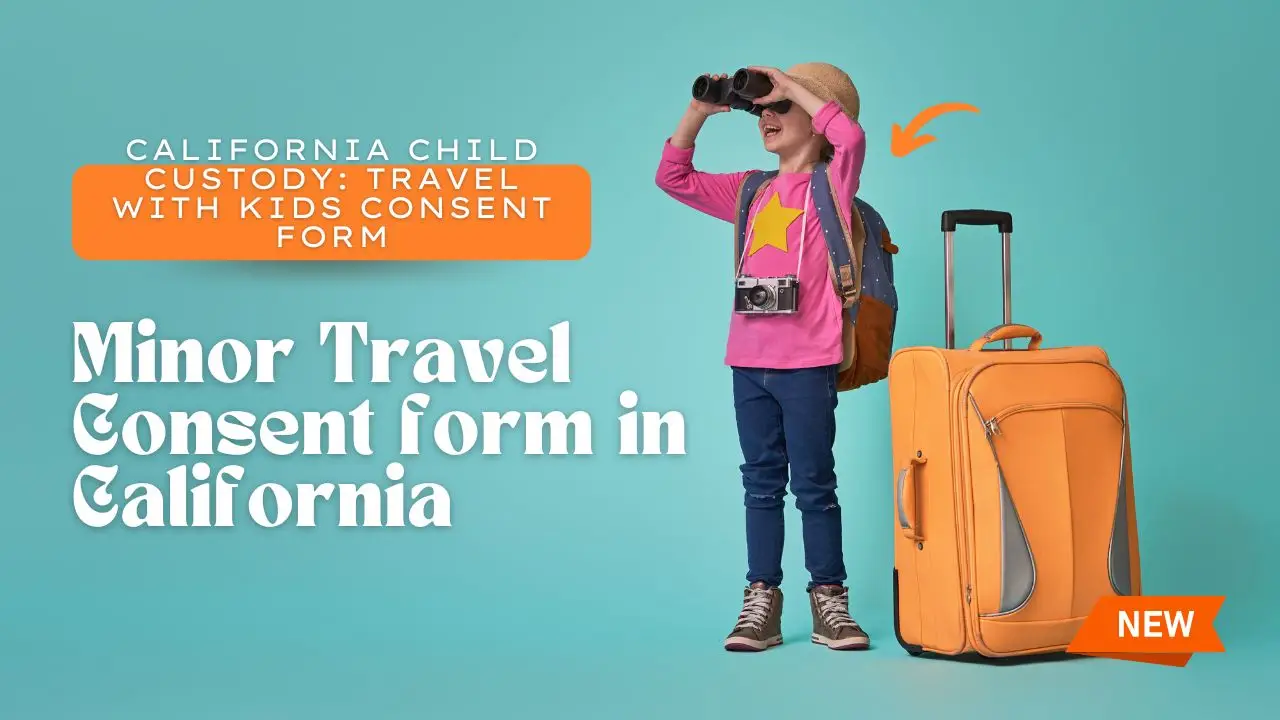Have you ever wondered how a divorce might impact your estate planning? Join Scott Levin California family law attorney for an enlightening discussion with esteemed San Diego estate planning attorney, Rod Hatley, who specializes in tax, estate planning, and asset protection. Using his deep well of knowledge and experience, Rod illuminates the crossroads of family law and estate planning, especially in relation to divorce proceedings. With topics that range from the timing of estate planning during a divorce to the concept of a “divorce will”, Rod’s expert advice will give you valuable guidance on how to protect your assets for your children, update your estate plans post-divorce, and considerations for co-owning property after a divorce.
Divorce is not just an emotionally draining process, it can also be a complex legal labyrinth, especially when it comes to estate planning and asset protection. In our latest podcast episode, we had an enlightening discussion with esteemed San Diego-based attorney, Rod Hatley, who specializes in tax, estate planning, and asset protection. His expert advice provided valuable guidance on how to navigate the crossroads of family law and estate planning during and after divorce. Learn more about this topic to better understand how asset protection and divorce intersect on LinkedIn.
One of the key areas of discussion was the concept of a “divorce will.” This is a unique legal instrument that allows a spouse undergoing divorce to protect their half of the community property for their children, excluding the soon-to-be-former spouse. It’s an important step during the divorce proceedings, which can ensure that your wishes are honored should something happen to you in the midst of the process.
Once the divorce is finalized, it is essential to update your estate plans. This is particularly important for the spouse who wasn’t the primary breadwinner or who is the custodial parent. The divorce may result in changes in property ownership, like being awarded the family home or buying a new home with the proceeds from the sale of the marital home. All these changes should be reflected in your estate plan to ensure that your children are well provided for.
An interesting point raised in our discussion was about co-ownership of property after divorce. While this may seem like a good idea for continuity, especially when children are involved, it does come with some potential pitfalls. Each spouse should ideally have a living trust owning their respective half of the property. This allows them to determine how their interest in the property should be distributed upon their death.
However, estate planning doesn’t stop at distributing assets upon death. It also includes provisions for scenarios where individuals might face mental incapacity due to an injury or disease. This is where living trusts play a critical role. A living trust becomes effective as soon as you sign it, providing a plan in case you become mentally incapacitated. It prevents the need for a conservatorship, which can be a lengthy and stressful process.
Moreover, a living trust can help avoid probate after death, leaving everything in the hands of the family. This offers peace of mind, knowing that your assets are protected and your wishes will be honored, no matter what the future holds.
In conclusion, estate planning is a crucial aspect of divorce that often gets overlooked. Whether you’re going through a divorce or just seeking a better understanding of estate planning, the guidance of an experienced attorney like Rod Hatley can help you secure your assets, protect your children’s future, and provide you with peace of mind during challenging times. And to learn more about Scott Levin and how we can assist during your divorce, schedule a consultation now.
Hi everyone. This is Scott Levin, Chief Peacekeeper. I’m an attorney mediator that helps people divorce outside of court, amicably and with the hope that they don’t hate each other at the end, especially if they have kids. Always good to be able to co-parent. I’m honored today to be joined by a friend and colleague named Rod Hatley. Rod is someone that I’ve worked with and known for a long time and I can’t think more highly of Rod. Can you introduce yourself and thanks for being there.
Rod Hatley:
Yeah, thanks Scott. Thanks for the opportunity. I’m Rod Hatley. I’m a tax, estate planning and asset protection attorney based here in San Diego. In my philosophy and I actually had this trademark the estate planning viewed through the lens of asset protection. Because we want to make sure that when we’re planning our clients’ estates, that we’re at least giving some thought to protecting those assets so that when they get downstream to the kids or the grandkids or whatever, they’re protected from later wall suits and or divorcing spouses.
Scott Levin:
Yeah, and Rod, if you look online, of course he has five-star reviews all over the place, but just in the legal network obviously we run in, san Diego is not a huge community. It actually feels kind of like a small town if you aren’t from outside of San Diego and the legal community is tight and small and Rod’s reputation is really top of the line. So I think you know. I kind of wanted to introduce the where family law and estate planning kind of intersect. Working in mediation, my clients are often are making, obviously, decisions about assets and debts moving forward and some of them have estate plans in place already that need to be revised, obviously if they’re divorcing and some don’t have estate plans. But now that they will be two separate individuals, it’s a time to look into it. So my guess, rod, my first question for you is if I have clients going through divorce and they’re working in mediation, when do you think it’s the best time for them to reach out to you so that they can make the best decisions during the divorce and, obviously, after?
Rod Hatley:
Okay, great question, scott. I think there is something that’s called a divorce will. So let’s say, mom and dad are getting divorced, mom may have particular desires, in other words, she wants to not provide for her soon to be former husband, and so she can do a will that will say basically, if something happens to me, then I want whatever my half of the community property is. I want it going downstream to my kids. And now let me back up just a moment. Now, if a married couple has a living trust in place which we hope that they do but if they do that we can’t change that because there’s an automatic stay when you file that divorce petition. So there is no prohibition against saying look, if something happens to me as one of the spouses, then I want to leave my half of the community property and any separate property that I have to my children. I don’t want it going to the other spouse. So that can certainly be done. Great information. I’ve seen that done in other cases before. So anyway, that’s one way to deal with that. Now, once the divorce becomes final and the marital settlement agreement is signed off on, etc. And the parties go their separate ways, perfect time, especially for, let’s say the wife, if she was not the primary breadwinner to get a plan in place. She’s also the custodial parent. She really wants to make sure she’s got a good plan in place. She may have been awarded the home or maybe, if the home was sold, she will possibly use those proceeds to buy a home for herself and the kids, and so that should go into the trust. And also she should nominate in her will or her will who the guardians for her kids would be. I mean obviously the surviving you know the husband survives. I mean he’d be the, obviously the natural choice. But should he not be available, then she could say, well, yeah, I would want the kids to go to whomever. These people would raise them and love them and instill the values that I hold dear to the in them, et cetera. So that can be a way to proceed. So it’s kind of like two time periods here. One is during the pendency of the divorce. A divorce will could be undertaken and then, of course, when that matter concludes and the solution is finalized, then it’d be a perfect time to do a regular full blown estate planning, including all the other documents that we you know we would want, like a power of attorney, healthcare directed, and if they’re minor kids, I mean we can do some great planning for them too. So if they have to get, mom isn’t around and there’s a way for the kids to be taken care of, go to the hospital et cetera. So hope that that makes sense.
Scott Levin:
Yeah, obviously we’re just gonna have a few questions today, but you can hear how knowledgeable and easy Rod breaks things down. Rod, some of my clients desire to continue to co-own real estate together after the divorce. That’s something that happens basically if they want the kids to stay in the house with one parent but continue to co-own the property. From your perspective, if a couple were to do that, would there be an estate if they didn’t have estate plans in place, or if they had a state plan trust in place prior to the divorce but they were going to continue to co-own property? Are there any unique issues there that you see?
Rod Hatley:
Well, I mean, you know, certainly it’s a counseling issue and that probably would have come from you to determine should the spouse that you’re representing, should he or she continue to co-own property with the other spouse or the soon to be ex-spouse? It could make sense and if it’s agreeable and ideally, if they’re working with you, it is agreeable, then it may not be a bad idea, although the pitfalls are. Well, you’d want that property owned and I’d recommend each of the spouses have a living trust that owned their respective half of property.
Scott Levin:
So in that case, if they each had a living trust, if one passed on while the co-ownership was taking place, similar to the divorce will, they could designate their interest to pass down how they’d like.
Rod Hatley:
Right, because it’s not going to go by way of community property, because that’s all been severed Correct. Yeah, they could definitely have their respective trust, own it as tenants in common. And then, of course, the spouse who died, assuming he or she had a living trust that owned his or her portion of the property let’s call it a half. Then they can leave a specific bequest in that trust document saying this is where I want my half of the property to go, which could be to save the children, the joint children, that they have together.
Scott Levin:
And that’s really the purpose of a trust, generally for people that don’t really understand them generally, it’s a way for you to designate how you want your assets, or anything else that you own, to pass down in the event of your death. Is that? How would you?
Rod Hatley:
Yeah, and let’s get just a little more granular. I don’t want to get too deep in the weeds here, but there are really two things that we have to be concerned about. First of all, you know, incapacity mental incapacity is a result of an injury or a disease. A living trust becomes effective now when you sign it, and if I pick on picking on myself if I became incapacitated mentally, then I’ve already got a plan in place. I don’t have to someone doesn’t have to put me in front of the probate court judge downtown and say your honor, this is Rod. He’s incompetent now to manage his affairs. Please appoint me to be his conservator. We just really a guardian for a grown person. But so that’s one concern. The other concern is passing on and we will all die at some point. So having a plan in place takes all the guesswork, and you know I’ve been through a seven year probate after my father passed away, and that’s not what my father wanted. But my father had leukemia, so at that point in his life he was making emotional decisions and you can understand why. So if we can get out ahead of this, we can frame up a great plan that’ll avoid the conservatorships so no probate and also avoid the death probate when someone passes away. So, and here’s the big insight, wills only become effective when you die. They don’t take effect. Well, I mean you sign them now but they won’t spring into effect until you pass. Then they don’t provide any avoidance of conservatorship and that sort of thing. So, and it guarantees probate too, because Wills have to go through probate. So, but trust them. So anything you know about the trust will avoid the conservatorship, avoid the probate, and it just leaves everything in the hands of the family, which I think is a much better answer. Again, anytime I can keep a client out of a probate court situation is a good day in my book.
Scott Levin:
And that’s great, and, rod, we’ll wrap up now. But can you, how can people find you? Where do they go to learn more?
Rod Hatley:
It’s. Thanks, scott. Go to the find us on the web wwwhatleyhtly Lawgroupcom. Atleylawgroupcom. And, for those who would like to schedule a 15 minute breakthrough, call that’s to find out. Would we be a good fit to work together? 858-465-8001,. 858-465-8001.
Scott Levin:
All right, rod. Well, thank you so much for being here. Really great information. I love the divorce. I love the divorce will that you mentioned. That’s real smart and I actually need to integrate that a lot more in my practice because, although my cases are relatively, people work actively with me for two, three months, so it’s not the long-term litigation that you see. Any divorce lawyer that’s watching this that has those two, two and a half year divorce cases routinely going on. I mean, obviously anything can happen in that period and my course will is really really smart. Great, great insight, thank you.

